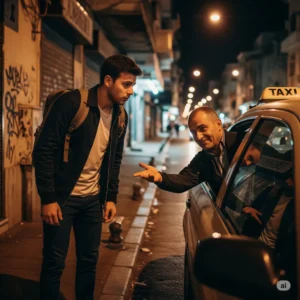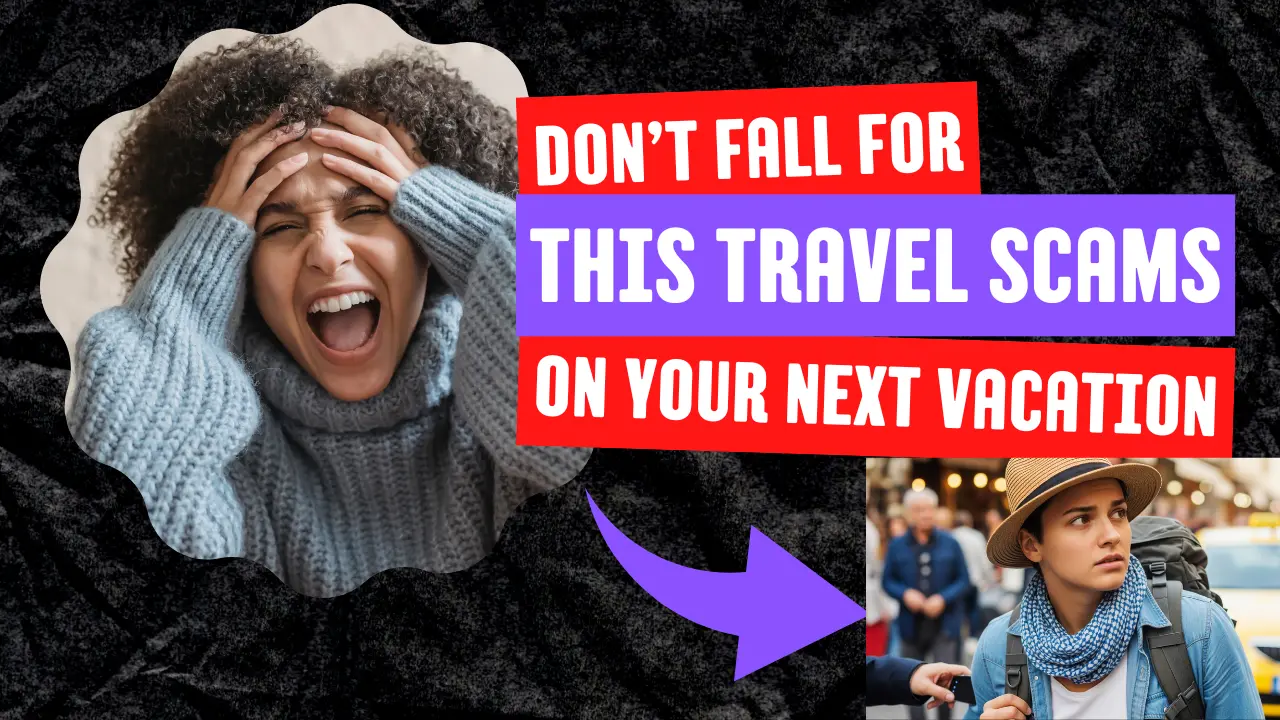Don’t Fall for These 7 Dreaded Travel Scams on Your Next Vacation: A Must-Read Guide!
Planning your dream vacation to a bustling city or a serene beach getaway? The excitement is palpable: new sights, sounds, and experiences await! However, hidden beneath the allure of travel lies a darker side – the persistent threat of travel scams. These cunning schemes can quickly turn your idyllic trip into a nightmare, costing you money, peace of mind, and even important documents.
In the United States, as well as internationally, travelers fall victim to scams ranging from subtle overcharging to elaborate cons. While travel insurance can offer a safety net for some unforeseen events, travel scams often leave you out of pocket and feeling vulnerable. The key to a worry-free journey is awareness and preparation. This guide will expose seven of the most common travel scams and arm you with the knowledge to protect yourself and your hard-earned vacation budget.
The Unlicensed Taxi Trap: When Your Ride Becomes a Rip-Off
One of the most frequent travel scams, especially in major tourist hubs, involves unscrupulous taxi drivers. You might be approached by seemingly friendly drivers offering flat rates from the airport or claiming their meter is “broken.” The goal? To drastically overcharge you. Or, they might take you on an incredibly long, circuitous route, racking up an exorbitant fare.
How to avoid it:
- Research reputable taxi services: Before you arrive, look up official taxi companies, ridesharing apps, or airport transfer services for your destination.
- Insist on the meter: If a taxi has a meter, demand that the driver use it. If they refuse or claim it’s broken, find another cab.
- Know the approximate fare: Ask your hotel, a trusted local, or check online for estimated taxi fares to your destination to avoid surprises.
- Avoid unsolicited offers: Be wary of drivers who aggressively approach you at airports or train stations. Stick to official taxi stands.

The “Attraction is Closed” Ploy: Redirecting Your Plans (and Wallet)
Imagine arriving at a famous landmark, only for a polite local to inform you it’s “closed for a holiday,” “under renovation,” or “has a special ceremony.” They then “helpfully” suggest an alternative, often a shop or restaurant owned by an accomplice, where you’ll be pressured into overpriced purchases or services.
How to avoid it:
- Verify opening hours in advance: Always check the official website of any attraction for its operating hours and any scheduled closures before you go.
- Trust official sources: If in doubt, ask hotel staff or check official tourist information centers, not random strangers on the street.
- Be firm and polite: If someone tries this trick, politely but firmly insist on going to your original destination or simply walk away.

The ATM Skimming & “Helpful” Stranger Scam: Digital Deception
ATM scams are rampant, involving hidden devices (skimmers) that steal your card information as you withdraw cash. Often, a “helpful” stranger will approach you, offering assistance with the machine or suggesting you use a different one, all while attempting to skim your card or observe your PIN.
How to avoid it:
- Inspect the ATM: Before inserting your card, check for anything unusual on the card reader (wiggly parts, glue, unusual additions) or the PIN pad (unusually thick or loose).
- Cover your PIN: Always shield the keypad with your hand when entering your PIN.
- Be wary of help: Politely decline any unsolicited “help” at an ATM. If you’re unsure, go inside a bank during business hours to use their ATM.
- Use bank-affiliated ATMs: Prefer ATMs located inside official bank branches rather than standalone machines in less secure areas.

Ai Generated
The Spill/Distraction Pickpocket: A Classic That Still Works
This is an old but effective trick. A scammer, or a team of them, will intentionally spill something on you (sauce, coffee, a drink) or create a sudden distraction (e.g., faking a fall, loud argument, “dropping” items). While you’re distracted or trying to clean yourself, an accomplice pickpockets your wallet, phone, or other valuables.
How to avoid it:
- Stay vigilant in crowded areas: Be extra aware of your surroundings in markets, public transport, and tourist spots.
- Secure your valuables: Keep wallets in front pockets, use a money belt, or anti-theft bags. Don’t leave phones or wallets on tables in outdoor cafes.
- Be suspicious of sudden commotion: Treat any unusual event as a potential distraction attempt and immediately secure your belongings.
- Don’t engage with overly helpful strangers: While most people are genuinely kind, be cautious if someone is overly insistent on helping you clean a spill or resolve a “problem.”

The Fake Booking/Rental Rip-Off: Your Dream Stay Becomes a Ghost Listing
Scammers create fake listings for vacation rentals or hotel rooms on seemingly legitimate websites, or even hijack real listings. You’ll pay for the booking, only to arrive and find the property doesn’t exist, is double-booked, or isn’t as advertised. This leaves you stranded and out of pocket.
How to avoid it:
- Book through reputable platforms: Use well-known, secure booking websites with strong buyer protection policies.
- Read reviews carefully: Pay close attention to reviews, especially those with photos uploaded by previous guests. Look for consistency and recent activity.
- Verify contact information: If possible, try to independently verify the contact details of the property or host.
- Use credit cards for payment: Credit cards offer better fraud protection than wire transfers, gift cards, or cryptocurrency, which are red flags if requested as the sole payment method.

Ai Generated
The Overpriced Souvenir/Bargaining Trap: When “Authentic” Means “Extortionate”
In bustling markets, vendors might aggressively pressure you to buy “authentic” or “rare” items at vastly inflated prices. This can also include scenarios like the “free bracelet” or “rose for your lady” scam, where someone puts an item on you and then demands payment, sometimes aggressively. Some might even engage you in a “friendly” chat, invite you for tea, and then present you with an outrageous bill for the “experience.”

How to avoid it:
- Research typical prices: Before shopping, get a sense of what local goods genuinely cost.
- Haggle politely (where appropriate): In cultures where bargaining is common, do so firmly but respectfully. Don’t feel pressured.
- Say “no” firmly: If someone tries to force an item on you, firmly say “no thank you” and walk away. Do not engage.
- Be wary of invitations: Be cautious of sudden invitations for tea ceremonies, art galleries, or private shops from strangers.
The Fake Wi-Fi Hotspot: Your Data is Their Gold
In the age of connectivity, free public Wi-Fi is a blessing, but it can also be a trap. Scammers set up fake, unsecured Wi-Fi hotspots with inviting names (e.g., “Free Airport Wi-Fi”). When you connect, they can easily intercept your data, including passwords, banking details, and personal information.

How to avoid it:
- Use official networks only: Always confirm the official name of the Wi-Fi network with airport staff, hotel reception, or a reputable source.
- Avoid unsecured networks: Never connect to a network that doesn’t require a password or looks suspicious.
- Use a Virtual Private Network (VPN): A VPN encrypts your internet connection, making it much harder for anyone to intercept your data, even on public Wi-Fi.
- Limit sensitive activities: Avoid online banking, shopping, or accessing sensitive accounts on public Wi-Fi, even with a VPN, if possible.
Your Ultimate Defense: Preparedness and Awareness
The best defense against travel scams is a combination of preparation, awareness, and a healthy dose of skepticism. Don’t let the fear of scams overshadow the joy of your vacation, but always be on your guard.
Key takeaways for a safe trip:
- Do your research: Learn about common scams in your destination.
- Trust your gut: If a deal seems too good to be true, it probably is. If a situation feels off, remove yourself.
- Secure your belongings: Use anti-theft measures and distribute your cash.
- Use secure payment methods: Prefer credit cards for better fraud protection.
- Keep copies of important documents: Store digital copies of your passport, visa, and reservations securely online or on a cloud service.
- Inform your bank: Notify your bank and credit card companies of your travel plans to avoid flagged transactions.
- Consider travel insurance: While it may not cover all scams directly, a comprehensive policy can help with stolen documents or unforeseen medical emergencies.
By being informed and cautious, you can navigate your travels safely and ensure your next vacation is filled with incredible memories, not regrettable encounters with con artists.


2 thoughts on “Don’t Fall for These 7 Dreaded Travel Scams on Your Next Vacation: A Must-Read Guide!”